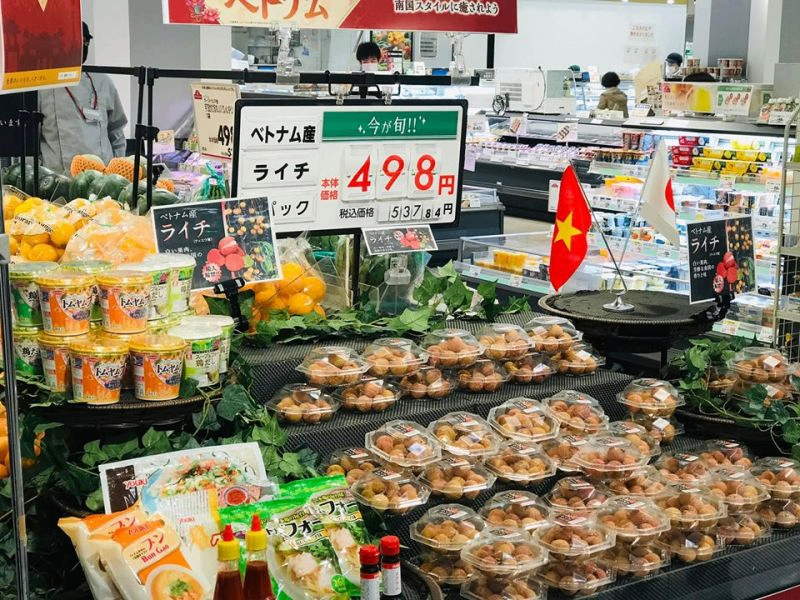The FTA promotes the complementary advantages of Vietnam-Japan cooperation and strengthens trade exchanges.
Japan is the partner that has signed the most bilateral and multilateral free trade agreements (FTAs) with Vietnam, which has opened up many opportunities for the two countries to strengthen trade cooperation, said Chen Kuang, director of the Asian-African Market Department of Vietnam's Ministry of Industry and Trade.。
Tran Quang Huy, director of the Asia-Africa Markets Department of the Ministry of Industry and Trade, said that Japan and Vietnam have signed many bilateral and multilateral free trade agreements (FTAs), including the ASEAN-Japan Comprehensive Economic Partnership Agreement (AJCEP), the Vietnam-Japan Economic Partnership Agreement (VJEPA), the Comprehensive and Progressive Trans-Pacific Partnership Agreement (CPTPP) and the Comprehensive Regional Economic Partnership Agreement (RCEP)。These free trade agreements have established an extremely important framework for cooperation between Vietnam and Japan, helping both sides to promote trade, investment and commercial relations between the two countries on the basis of the principle of mutual benefit.。
Vietnam and Japan formally established diplomatic relations on September 21, 1973. Since then, the two countries have established friendly and cooperative relations in many fields.。Japan is currently one of Vietnam's most important economic partners and the first G7 country to recognize Vietnam's market economy status (October 2011)。therefore, there are many opportunities for the two countries to continue to promote trade and investment cooperation。
The economies of Vietnam and Japan are highly complementary and there are many opportunities for cooperation in the field of trade.。With a highly developed economy and world-leading technology, Japan is one of the leading countries in the application of science and technology and the development of digital economy and society.。At the same time, Vietnam's economy is highly open, maintaining a rapid development speed, young human resources are abundant, and the demand for improving competitiveness and industrial production efficiency is increasing。
Therefore, Vietnam and Japan have great potential for cooperation in the fields of technological innovation, digital transformation and supply chain diversity.。
In general, the structure of imports and exports between Vietnam and Japan is clearly complementary and there is no possibility of direct competition.。Vietnam mainly exports seafood, crude oil, textiles, wires and cables, wood and wood products, computers and parts, coal, footwear, etc. to Japan。As for imports, Vietnam imports items from Japan for industrial production, such as machinery, equipment, tools and parts, electronic products and parts, various steels, various fabrics, auto parts, plastic materials, chemicals, Textile materials, footwear, etc.。
It can be said that Vietnam's strengths and potential to meet the import needs of Japan's many goods, can become Japan's main source of supply。
Statistics show that the bilateral trade volume between Vietnam and Japan has increased year by year, reaching US $40 billion, US $42.7 billion and US $47.6 billion in 2020, 2021 and 2022 respectively, reaching nearly US $37 billion in the first 10 months of 2023.。
In terms of investment, Japan is the third largest foreign direct investment country in Vietnam (after South Korea and Singapore), with 5,227 active investment projects as of October 20, 2023, with a total registered investment of over 714..100 million dollars。At the same time, Vietnam has 106 investment projects in Japan, with a total registered investment of about 19.5 million US dollars.。
In addition, Japan is also Vietnam's largest official development assistance (ODA) provider, accounting for about 30% of the total funds provided by foreign sponsors to Vietnam, reaching 29.3 billion U.S. dollars;。Japan's ODA has transferred many advanced technologies and trained high-quality human resources to Vietnam, making important contributions to the development of key infrastructure projects in Vietnam and promoting sustainable socio-economic development.。
Vietnam's Minister of Industry and Trade Nguyen Hong Yen said that the contribution of Japanese investors to Vietnam's productivity has enabled more Vietnamese companies to participate in the supply chain of Japanese and global companies.。At the same time, he suggested that Japan encourage more enterprises to transfer industries to Vietnam, especially in key industries and supporting industries.。

According to Dang Phuc Nguyen, secretary general of the Vietnam Vegetable and Fruit Association, the Japanese market accounts for about 5% of Vietnam's fruit exports, with a total value of about 1%..500 million dollars。Last year, Japan imported value 1 from Vietnam..$6.5 billion in fruit, 4% of Vietnam's fruit and vegetable market share。Currently, Vietnamese fruits such as dragon fruit, mango, durian, coconut, lychee, longan and banana have a large market share in Japan and are increasingly popular。
However, Japan has very high standards for imported fruits and vegetables。For agricultural, forestry and aquaculture products, in order to enter the Japanese market, it is necessary to ensure food hygiene and safety standards as well as animal and plant quarantine standards, and to produce and raise them in accordance with Japanese agricultural standards such as GAP, HACCP and JAS.。
Ta Minh Duc, Vietnamese Trade Counsellor in Japan, suggested that Vietnamese enterprises should pay attention to stable product quality and preservation technology in fruit products exported to Japan。He said: "Due to Japan's low inflation rate, Vietnamese exporters should not raise prices too much to avoid losing competitiveness.。"
Experts predict that cooperation between Vietnam and Japan will receive more support as businesses from both countries make full use of the advantages and tax benefits brought by free trade agreements such as the CPTPP and RCEP.。
The two sides stressed that Vietnam has been the preferred destination for Japanese companies due to its market size and growth potential, stable political and social situation, and high-quality human resources.。A 2022 survey by the Japan Trade Promotion Agency (JETRO) shows that 60% of Japanese companies plan to expand their operations in Vietnam in the next two years。Industry sources said that this will be an important impetus to strengthen trade between the two sides.。
·Original
Disclaimer: The views in this article are from the original Creator and do not represent the views or position of Hawk Insight. The content of the article is for reference, communication and learning only, and does not constitute investment advice. If it involves copyright issues, please contact us for deletion.